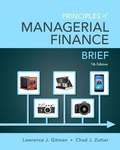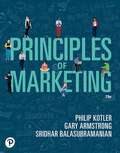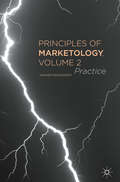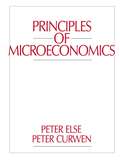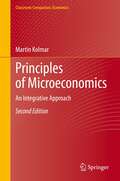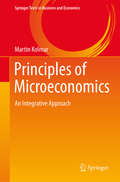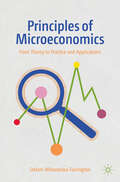- Table View
- List View
Principles of Managerial Finance Brief, Seventh Edition
by Lawrence J. Gitman Chad J. ZutterThis seventh edition guides students through complex material with a proven learning goal system. This system - a hallmark feature of Principles of Managerial Finance, Brief -weaves pedagogy into concepts and practice, giving students a roadmap to follow through the text and supplementary tools.
Principles of Marketing
by Philip Kotler Gary ArmstrongToday’s marketing challenge is creating vibrant, interactive communities of consumers who make products and brands a part of their daily lives. Learn how to create value and gain loyal customers. Kotler/Armstrong is a comprehensive, classic principles text organized around an innovative customer-value framework. Students learn how to create customer value, target the correct market, and build customer relationships. The changing nature of consumer expectations means that marketers must learn how to build communities in addition to brand loyalty.
Principles Of Marketing
by Philip. Kotler Gary Armstrong Sridhar BalasubramanianIn a fast-changing, increasingly digital and social marketplace, it's more vital than ever for marketers to develop meaningful connections with their customers. Principles of Marketing shows you how to create vibrant, interactive communities of consumers who make products and brands an integral part of their daily lives. To help you master this key marketing challenge, the authors present the fundamentals of marketing within an innovative customer-value framework. The 19th Edition has been thoroughly revised to reflect the major trends impacting contemporary marketing. It's packed with stories illustrating how companies use new digital technologies to maximize customer engagement and shape brand conversations, experiences and communities.
Principles Of Marketing
by Philip T. Kotler Gary ArmstrongIn a fast-changing, increasingly digital and social marketplace, it's more vital than ever for marketers to develop meaningful connections with their customers. Principles of Marketing helps readers master today's key marketing challenge: to create vibrant, interactive communities of consumers who make products and brands an integral part of their daily lives. To help individuals understand how to create value and build customer relationships, Kotler and Armstrong present fundamental marketing information within an innovative customer-value framework.
Principles of Marketing
by Jeff Tanner Mary Anne RaymondThis book is intended for a two-semester course in economics taught out the social sciences or business school.
Principles of Marketing 2.0
by Mary Anne Raymond Jeff TannerPrinciples of Marketing Version 2.0 by Tanner, Raymond and Schuster teaches the experience and process of actually doing marketing - not just the vocabulary. It carries five dominant themes throughout in order to expose students to marketing in today's environment: Service dominant logic - This textbook employs the term "offering" instead of the more traditional First "P" -- product. That is because consumers don't sacrifice value when alternating between a product and a service. They are evaluating the entire experience, whether they interact with a product, a service, or a combination. So the fundamental focus is providing value throughout the value chain, whether that value chain encompasses a product, service, or both. Sustainability; Increasingly, companies are interested in the impact they are having on their local community as well as the overall environment. This is often referred to as the triple bottom line of financial, social, and environment performance. Ethics and social responsibility; Following on the sustainability notion is the broader importance of ethics and social responsibility in creating successful organizations. The authors make consistent references to ethical situations throughout chapter coverage, and end of chapter material in most chapters will encompass ethical situations. Global coverage -- Tanner, Raymond and Schuster deliberately entitled Chapter 1; What is Marketing?; Whether it is today's price of gasoline, the current U.S. presidential race, or Midwestern U.S. farming, almost every industry and company needs strong global awareness. And today's marketing professionals must understand the world in which they and their companies operate. Metrics -- Firms today have the potential to gather more information than ever before about their current and potential customers. That information gathering can be costly, but it can also be very revealing. With the potential to capture so much more detail about micro transactions, firms should now be more able to answer ;well, what this marketing strategy really worth it?; And what is the marketing ROI?; And finally, what is this customer or set of customers worth to us over their lifetime? Principles of Marketing Version 2.0 brings new and updated coverage of new developments in the influence of social media to empower consumers, as well as marketing's use of social media, such as sentiment analysis, mobile marketing, and customer service and complaint tracking, as a communications and promotion channel, just a name a few. Version 2.0 also has an overall increased number of examples, as well as, new discussion questions in every chapter (resulting in at least 10 per chapter). In addition, the textbook's key terms, and repeated concepts have been strategically arranged to make customizing this book with Flat World's MIYO platform even easier.
Principles of Marketing 2.0
by Jeff Tanner Mary Anne RaymondPrinciples of Marketing Version 2.0 by Tanner, Raymond and Schuster teaches the experience and process of actually doing marketing - not just the vocabulary. It carries five dominant themes throughout in order to expose students to marketing in today's environment: Service dominant logic - This textbook employs the term "offering" instead of the more traditional First "P" -- product. That is because consumers don't sacrifice value when alternating between a product and a service. They are evaluating the entire experience, whether they interact with a product, a service, or a combination. So the fundamental focus is providing value throughout the value chain, whether that value chain encompasses a product, service, or both. Sustainability; Increasingly, companies are interested in the impact they are having on their local community as well as the overall environment. This is often referred to as the triple bottom line of financial, social, and environment performance. Ethics and social responsibility; Following on the sustainability notion is the broader importance of ethics and social responsibility in creating successful organizations. The authors make consistent references to ethical situations throughout chapter coverage, and end of chapter material in most chapters will encompass ethical situations. Global coverage -- Tanner, Raymond and Schuster deliberately entitled Chapter 1; What is Marketing?; Whether it is today's price of gasoline, the current U.S. presidential race, or Midwestern U.S. farming, almost every industry and company needs strong global awareness. And today's marketing professionals must understand the world in which they and their companies operate. Metrics -- Firms today have the potential to gather more information than ever before about their current and potential customers. That information gathering can be costly, but it can also be very revealing. With the potential to capture so much more detail about micro transactions, firms should now be more able to answer ;well, what this marketing strategy really worth it?; And what is the marketing ROI?; And finally, what is this customer or set of customers worth to us over their lifetime? Principles of Marketing Version 2.0 brings new and updated coverage of new developments in the influence of social media to empower consumers, as well as marketing's use of social media, such as sentiment analysis, mobile marketing, and customer service and complaint tracking, as a communications and promotion channel, just a name a few. Version 2.0 also has an overall increased number of examples, as well as, new discussion questions in every chapter (resulting in at least 10 per chapter). In addition, the textbook's key terms, and repeated concepts have been strategically arranged to make customizing this book with Flat World's MIYO platform even easier.
Principles of Marketing (customized edition)
by Jeff Tanner Mary Anne RaymondThis book teaches the experience and process of actually doing marketing - not just the vocabulary. It carries five dominant themes throughout in order to expose students to marketing in today's environment. This is a customized textbook.
Principles of Marketing for a Digital Age
by Dr. Tracy L. TutenStudent-led in its design and development, the book incorporates digital marketing as central to what marketers do, and combines quality examples, assessment and online resources to support the teaching and learning of introductory marketing in a digital age. The author integrates digital and social media marketing throughout the chapters and through student involvement in the development of it, the text has been made to be approachable and to appeal to students, with infographics, numerous images, and an engaging writing style. It facilitates the &“flipped&” approach to classroom teaching and is supported by a number of features and activities in every chapter, encouraging students to undertake course reading, class participation and revision. It includes case studies from global companies such as Nutella, Google, L&’Oreal, Netflix, Airbnb, BirchBox, Uber, FitBit, Visit California and Coca-Cola. It also takes a social view of marketing, featuring cases tied to the UN&’s PRME initiative to aid students in becoming sustainably-minded individuals. The book is complemented by online instructor resources, including chapter-specific PowerPoint slides, an instructor manual, flipped classroom activities, as well as open access multiple choice questions (with solutions), videos, case studies, weblinks, a glossary and SAGE journal articles for students. To find out more and for a quick sneak peek, watch our video on the book's story.
Principles of Marketing for a Digital Age
by Tracy L. TutenWinner of the TAA 2021 Most Promising New Textbook award! This award-winning textbook introduces you to all the essential concepts and tools for marketing in a digital age. The new second edition retains a strong focus on digital and social media marketing, and has been updated to include cutting-edge coverage on the implications of Covid-19 on consumer behavior. Greater emphasis has been placed on sustainability, diversity and inclusion, providing you with the skills you will need to become an ethical and socially-minded marketer. The new edition also includes: • Over 30 case studies from global companies, including Netflix, Amazon, Zara, Tony’s Chocolonely, Nissan, and Airbnb • A revamped ‘Sustainability Spotlight’ feature in every chapter that aligns with the UN’s Principles for Responsible Management Education (PRME) initiative • A wide range of critical thinking questions that encourage you to reflect on real-world examples and scenarios. This textbook is your essential guide to marketing as part of an introductory marketing course at college or university. Principles of Management for a Digital Age is accompanied by online resources for instructors, including PowerPoints, a testbank, selected content from SAGE Business Cases and a teaching guide containing lecture objectives, chapter outlines, activities and discussion questions. Students can access additional video content and further reading for each chapter. Tracy L. Tuten is a professor of marketing at Sofia University, USA.
Principles of Marketing for a Digital Age
by Tracy L. TutenWinner of the TAA 2021 Most Promising New Textbook award! This award-winning textbook introduces you to all the essential concepts and tools for marketing in a digital age. The new second edition retains a strong focus on digital and social media marketing, and has been updated to include cutting-edge coverage on the implications of Covid-19 on consumer behavior. Greater emphasis has been placed on sustainability, diversity and inclusion, providing you with the skills you will need to become an ethical and socially-minded marketer. The new edition also includes: • Over 30 case studies from global companies, including Netflix, Amazon, Zara, Tony’s Chocolonely, Nissan, and Airbnb • A revamped ‘Sustainability Spotlight’ feature in every chapter that aligns with the UN’s Principles for Responsible Management Education (PRME) initiative • A wide range of critical thinking questions that encourage you to reflect on real-world examples and scenarios. This textbook is your essential guide to marketing as part of an introductory marketing course at college or university. Principles of Management for a Digital Age is accompanied by online resources for instructors, including PowerPoints, a testbank, selected content from SAGE Business Cases and a teaching guide containing lecture objectives, chapter outlines, activities and discussion questions. Students can access additional video content and further reading for each chapter. Tracy L. Tuten is a professor of marketing at Sofia University, USA.
Principles of Marketing (Sixteenth Edition)
by Philip Kotler Gary ArmstrongPrinciples of Marketing Is the most-trusted source for teaching and learning basic marketing concepts and practices. More than ever, the sixteenth edition introduces new marketing students to the fascinating world of modern marketing in an innovative, complete, and authoritative yet fresh, practical, and enjoyable way. In this sixteenth edition, we've once again added substantial new content and poured over every page, table, figure, fact, and example in order to keep this the best text from which to learn about and teach marketing. Enhanced by MyMarketingLab, our online homework and personalized study tool, the sixteenth edition of Principles of Marketing remains the world standard in introductory marketing education.
Principles of Marketing Version 4.0
by Jeff Tanner Mary Anne RaymondPrinciples of Marketing is an up-to-date overview of how marketing is actually done in today's world. It is a valuable resource for a first course in marketing at any level, clearly explaining effective marketing strategies and proven techniques.
Principles of Marketology, Volume 2
by Hashem AghazadehBusinesses today operate in a more complex and turbulent environment and face intense competition. To be successful, businesses must intelligently understand and deal with their changing environment and market. In this book, Hashem Aghazadeh introduces marketology as a market-related system that enables businesses to achieve competitive success through providing superior value to their key stakeholders. In this regard, the hyper-function of marketology supports business executives to make effective market-related decisions and take efficient market-related actions throughout the organization. Principles of Marketology, Volume 2: Practice concentrates on how to deploy and practice marketology architecture all over the organization. Marketology accomplishes business performance and success based on its organizational design and behavior. In this regard, marketology contributes through generation, dissemination, and exploitation of market intelligence and insight. The future of marketology is contemplated and an integrated guideline of practicing marketology is provided.
Principles of Mathematical Economics
by Shapoor ValiUnder the assumption of a basic knowledge of algebra and analysis, micro and macro economics, this self-contained and self-sufficient textbook is targeted towards upper undergraduate audiences in economics and related fields such as business, management and the applied social sciences. The basic economics core ideas and theories are exposed and developed, together with the corresponding mathematical formulations. From the basics, progress is rapidly made to sophisticated nonlinear, economic modelling and real-world problem solving. Extensive exercises are included, and the textbook is particularly well-suited for computer-assisted learning.
Principles of Mathematical Economics II
by Shapoor ValiThis manual provides solutions to approximately 500 problems appeared in various chapters of the text Principles of Mathematical Economics. In some cases, a detailed solution with the additional discussion is provided. At the end of each chapter, new sets of exercises are given.
Principles Of Micro-economics
by Ryan C. Amacher Richard J. Sweeney Lloyd M. ValentineIn the early 1970s, the economics profession and the teachers of introductory economics courses went through an exhaustive search for "relevance," in large part because students demanded it. Unfortunately, this search for relevance produced a large number of "cute" applications aimed superficially at catching students' (or instructors') eyes. <P><P>We learned, for example, that supply and demand can be applied to markets for illegal drugs and marketable sex. The results of this rush toward relevance, however, were predictable. Some students were offended, others were amazed, and many were bored. Instructors for the most part then fell back on the tested (and familiar) ways of approaching the subject of economics. <P><P>Our goal in writing this book has been to show students the relevance of the economic approach as it applies both to important real-world situations and to economic policymaking. This is not easily accomplished. Today's students are not deceived by slick marketing techniques. If the economic approach is a relevant way to approach social and political problems, students must be convinced through application and example. This book is intended to accomplish that difficult task.
Principles of Microeconomics
by Ben Bernanke Kate Antonovics Ori Heffetz Robert FrankPrinciples of Microeconomics focuses on seven core principles to produce economic naturalists through active learning. By eliminating overwhelming detail and focusing on core principles, students from all backgrounds are able to gain a deeper understanding of economics. Focused on helping students become "economic naturalists," people who employ basic economic principles to understand and explain what they observe in the world around them. COVID-19 pandemic content, analysis, and examples further engage students. With engaging questions, explanations, exercises and videos, the authors help students relate economic principles to a host of everyday experiences such as going to the ATM or purchasing airline tickets. Throughout this process, the authors encourage students to become "economic naturalists." Author developed Learning Glass concept overview videos and Worked Problem videos give students an overview of challenging and important concepts. With new videos and engagement tools in Connect, like Application-Based Activities, alongside SmartBook''s adaptive reading experience, the 8th edition enables instructors to spend class time engaging, facilitating, and answering questions instead of lecturing on the basics.
Principles Of Microeconomics
by Karl Case Ray Fair Sharon OsterIntended primarily for the one semester principles of microeconomics course, this text also provides practical content to current and aspiring industry professionals.
Principles of Microeconomics
by Peter Curwen Peter ElseElse and Curwin make an effort to keep the student in touch with recent developments by including such topics as bargaining search, contestable markets and voting behaviour...it will certainly appeal to those who wish to keep economic theory accessible to as wide a range of students as possible.' Times Higher Education Supplement This clear, concise introduction to intermediate microeconomics is essential reading for students with previous knowledge of economic principles. Geared to the standard year's course in universities and polytechnics, the treatment in this text reinforces the student's understanding of familiar topics and facilitates assimilation of new material.
Principles Of Microeconomics
by Robert H. Frank Ben BernankeA book that encourages students become "economic naturalists," people who employ basic economic principles to understand and explain what they observe in the world around them.
Principles of Microeconomics: An Integrative Approach (Classroom Companion: Economics)
by Martin KolmarThis textbook provides a comprehensive and unique introduction to modern microeconomics. It adopts an integrative approach, positioning the main findings of economics in a broader context. It critically reflects on theories from a philosophical standpoint and compares them to approaches found in the social sciences, while at the same time highlighting the implications for the design of legal systems and business practices.Intended for undergraduate students, the book presents brief examples and comprehensive case studies to help them grasp the real-world implications of the theories. As such, it is suitable for an applied, yet technically precise approach to teaching microeconomics, as well as for a critical review of the economic mainstream. Starting from the question as to why and how societies organize economic activity, it analyzes the potential and limitations of various types of market with regard to alleviating scarcity and achieving distributive objectives, from an institutional perspective.This second edition systematically expands on decision theory by including chapters on traditional decision theory under risk and uncertainty, and on behavioral economics, as well as a chapter presenting findings from the neurosciences, evolutionary psychology, and narrative psychology. Furthermore, there are theoretical additions, along with updated case studies and examples – from trade wars to pandemics and the climate crisis.A new edition of the companion workbook features a wealth of exercises, ranging from basic multiple-choice questions to challenging mathematical problems and case studies, is also available.
Principles of Microeconomics: An Integrative Approach (Springer Texts in Business and Economics)
by Martin KolmarThis text provides a comprehensive and unique introduction to modern microeconomics. It pursues an integrative approach by putting the main findings of economics into a broader perspective; theories are critically reflected on from a philosophical standpoint and by comparing them to approaches found in the social sciences, while implications for the design of the legal system and business practices are highlighted throughout. In addition, the book presents brief examples and comprehensive case studies to facilitate an understanding of the theories’ real-world implications.Starting from the question as to why and how societies organize economic activity, the book adopts an institutional perspective to analyze the potential and limitations of different market types with regard to alleviating scarcity and achieving distributive objectives.It not only covers traditional rational-choice models, but also systematically introduces readers to important findings from behavioral economics and psychology.A companion workbook is available which features a wide variety of exercises, ranging from basic multiple-choice questions to challenging mathematical problems and case study scenarios.
Principles Of Microeconomics
by N. Gregory MankiwNow readers can master the principles of microeconomics with the help of the most popular introductory book in economics today that is widely used around the world -- Mankiw’s PRINCIPLES OF MICROECONOMICS, 8E. <P><P>With its clear and engaging writing style, this book emphasizes only the material that readers are likely to find most interesting about the economy, particularly if they are studying economics for the very first time. <P><P>Reader discover interesting coverage of the latest relevant microeconomic developments with real-life scenarios, useful economic facts, and clear explanations of the many ways microeconomic concepts play a role in the decisions that individuals make every day.
Principles of Microeconomics: From Theory to Practice and Applications
by Stefani Milovanska-FarringtonThis textbook offers a comprehensive overview of microeconomics, featuring teachable and applicable approaches to core concepts. It includes fresh examples and applications to help students understand and apply opportunity cost, choice theory, and more to their own world. Throughout the book, there are practice problems with step-by-step solutions that help students better understand the topics covered. Sections provide scenarios to help students analyze consumer choices as well as the decisions of firms. Readers will learn how to evaluate the impact of microeconomic policies and how to perform equilibrium analysis. The author publishes digital worksheets with questions based on recent news stories that readers can use as they work through the book: https://econstefani.substack.com/. The book, combined with these free materials, introduces new and fresh approaches to help students apply fundamental concepts to the world around them. The resulting book is a valuable learning tool that highlights microeconomic principles for a new generation of learners.
